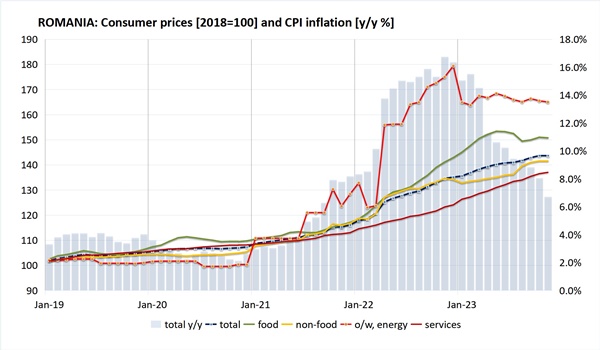One year after it peaked at 16.8% y/y, Romania’s headline inflation dropped by 10 percentage points (pp) to 6.7% in November 2023, on a combination of base effects and decreasing prices of food and fuels, according to bne IntelliNews.
CORE2 inflation diminished by 1.25pp from October to November, dropping just under 9% y/y from the 14.2% y/y peak in February.
Both headline and CORE2 inflation rates thus dropped below the respective levels projected by the National Bank of Romania (BNR) for the end of the year.
It is worth noting that the disinflation occurred amid robust private consumption and constantly increasing (in real terms) wages.
A sustainable decrease in the CORE2 inflation is requisite for the central bank to consider relaxing its monetary policy rate, currently at 7%. The fiscal package enforced by the government is expected to generate an inflationary wave in the first months of 2024 and BNR will wait to see its magnitude before taking further steps accordingly. The direction of the fiscal policy, and its credibility, will be another factor.
Compared to two years earlier (in November 2021), consumer prices in Romania rose by 25% while they surged by 34% over the past three years.
On a medium-term perspective, food prices rose faster than average: by 30% during the past two years (+25% consumer price average) and by 38% during the past three years (+34% consumer price average). The recent slowdown (-0.16% m/m in November) is thus rather a correction.
The energy prices (at the level of residential consumers) dropped by 5.7% y/y as of November 2023, but they were still 34% higher than two years earlier and 65% higher than three years earlier.



